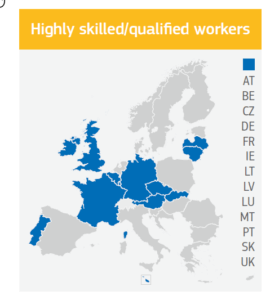Stay in the loop! Subscribe to our mailing list
The European Migration Network (EMN) has published its annual report on migration and asylum state of play and developments in the EU Member States (MS) based on the available data for the year 2019. As every year, the report provides a comprehensive overview of the latest developments, in policy and practice, in a wide range of relevant areas, from legal and illegal migration, international protection, integration, return and readmission, to unaccompanied minors and vulnerable groups, to borders, visas and Schengen governance.
Among the key findings highlighted in the report, some pertain to introducing more favourable approaches in attracting international talent and qualified workers, as well as integration measures for third-country nationals, mainly with a focus on socio-economic integration. However, 2019 has also marked the first increase in asylum applications since 2015.
Attraction of highly qualified third-country nationals has been in the focus of several member states in the recent period, largely reflected in efforts to simplify administrative and legal requirements for their stay and employment. Notably, one third of MS report developments aimed at attracting and retaining international students and researchers (e.g. through simplified or fast-track procedures, digitalisation of application and registration, etc.). To better support international graduates in transition to the labour market, some MS have, for example, adapted the minimum requirements of the 2016 ‘Students and Researchers Directive' to facilitate access to employment. Further actions across the EU to attract skilled labour force span from widening the scope of eligible profile for highly skilled foreign workers to improving salary conditions or support for employers seeking foreign talent. The map below shows which MS introduced measures to facilitate admission of highly skilled workers, in particular.
From among the enhanced processes towards better integration of migrants, socio-economic integration – including labour market integration, education and language training provision – was in considerable focus. Additionally, new or enhanced activities aimed at promotion of non-discrimination, promotion of civic integration through (mandatory) integration courses, supporting local authorities and integration staff with practical tools and training. At EU level, a range of stakeholder meetings took place in 2019 to bring together bodies responsible for managing and funding migration, education and development-related initiatives to discuss suitable approaches in supporting third-country nationals.
In 2019 there was an increase of 11.4% as compared to 2018 in the number of asylum applications in the EU, the first increase since 2015. Germany, France, Spain, Greece and Italy respectively account for the highest number of applications, while the three major countries of applicants’ origin are Syria, Afghanistan and Venezuela. Although MS do not report major challenges in dealing with the new increase, there have been efforts to improve the efficiency and quality of national asylum systems and facilitate processing of applications. Despite the increase in applications, the reported number of positive decisions in 2019 is close to the numbers in 2018. It is hoped that the upcoming New Pact on Migration and Asylum would not only facilitate asylum procedures, but also ensure solidarity in balance with adequate support for the countries under most pressure.

The EMN report is available here.